IQue: Difference between revisions
(→History: Added information about number of games released.) |
mNo edit summary |
||
| Line 15: | Line 15: | ||
iQue Ltd. was founded with a registered capital of $30m in December 2002 and established its headquarter in {{wp|Suzhou|Suzhou, China}} in May 2003. Investment from both parties (Nintendo and Wei Yen) include capital, technology, patents, software copyright and other intellectual properties.<ref name=about/> According to some former employees, iQue stayed independent in its financial and marketing in the first few years,<ref>“‘颜老板在的时候,神游的财务、销售都是独立的,可以自己作主,不用管任天堂的规定。’神游前员工说。当时的神游,与任天堂只是商业合作伙伴的关系,不存在任何行政上的从属关系。” 大狗 (June 22, 2016). [http://www.chuapp.com/2016/06/22/251110.html 《记录》第17期:神游中国(上)]. 触乐. Retrieved January 28, 2017.</ref> and was a cooperation partner of Nintendo instead of a subordinate agency.<ref>From the opening of an interview conducted on the now-defunct Chinese forum ''levelup.cn'' between iQue staff and players on August 1, 2007: “iQue神游不是任何一家公司的代理商,iQue拥有各个软硬件的自主产权……” Text of the interview has been researched by 我是金属狂人 (April 15, 2013). [http://tieba.baidu.com/p/2270337246 【考古汇总】iQue会客厅 神游访谈录问答精选]. Baidu Tieba. Retrieved February 17, 2017.</ref> Prior to iQue, Nintendo had introduced the [[Game Boy Advance]] console to China via a Hong Kongese sales agent named Mani (<span class=explain title="Wànxìn">万信</span>)<ref>The official English name of 万信 is seen from Aquariuslegend (January 23, 2017). [https://chiphell.com/thread-1698489-1-1.html 万信国行初代GB 任天堂 GAME BOY 开箱]. ''Chiphell''. Retrieved February 5, 2017.</ref>, but faced several challenges such as the rampant piracy among Chinese game retailers and the government's ban on video game consoles, which led to the partnership with Wei Yen to solve these issues via localization. (Mani remained as Nintendo's agent in Hong Kong and Taiwan up until the DS era.)<ref>我是金属狂人 (June 24, 2013). [http://tieba.baidu.com/p/2413947265 任天堂在中国摸爬滚打20年的光辉岁月]. ''{{wp|Baidu Tieba}}''. Retrieved February 6, 2017.</ref> | iQue Ltd. was founded with a registered capital of $30m in December 2002 and established its headquarter in {{wp|Suzhou|Suzhou, China}} in May 2003. Investment from both parties (Nintendo and Wei Yen) include capital, technology, patents, software copyright and other intellectual properties.<ref name=about/> According to some former employees, iQue stayed independent in its financial and marketing in the first few years,<ref>“‘颜老板在的时候,神游的财务、销售都是独立的,可以自己作主,不用管任天堂的规定。’神游前员工说。当时的神游,与任天堂只是商业合作伙伴的关系,不存在任何行政上的从属关系。” 大狗 (June 22, 2016). [http://www.chuapp.com/2016/06/22/251110.html 《记录》第17期:神游中国(上)]. 触乐. Retrieved January 28, 2017.</ref> and was a cooperation partner of Nintendo instead of a subordinate agency.<ref>From the opening of an interview conducted on the now-defunct Chinese forum ''levelup.cn'' between iQue staff and players on August 1, 2007: “iQue神游不是任何一家公司的代理商,iQue拥有各个软硬件的自主产权……” Text of the interview has been researched by 我是金属狂人 (April 15, 2013). [http://tieba.baidu.com/p/2270337246 【考古汇总】iQue会客厅 神游访谈录问答精选]. Baidu Tieba. Retrieved February 17, 2017.</ref> Prior to iQue, Nintendo had introduced the [[Game Boy Advance]] console to China via a Hong Kongese sales agent named Mani (<span class=explain title="Wànxìn">万信</span>)<ref>The official English name of 万信 is seen from Aquariuslegend (January 23, 2017). [https://chiphell.com/thread-1698489-1-1.html 万信国行初代GB 任天堂 GAME BOY 开箱]. ''Chiphell''. Retrieved February 5, 2017.</ref>, but faced several challenges such as the rampant piracy among Chinese game retailers and the government's ban on video game consoles, which led to the partnership with Wei Yen to solve these issues via localization. (Mani remained as Nintendo's agent in Hong Kong and Taiwan up until the DS era.)<ref>我是金属狂人 (June 24, 2013). [http://tieba.baidu.com/p/2413947265 任天堂在中国摸爬滚打20年的光辉岁月]. ''{{wp|Baidu Tieba}}''. Retrieved February 6, 2017.</ref> | ||
On November 17, 2003, the highly-localized {{wp|iQue Player}} (<span class=explain title="shén yóu jī">神游机</span>), based on [[Nintendo 64]] but with anti-piracy mechanisms, was released. The iQue Player was unique that all the components were inside the controller and that it loaded games from a single, 64MB flash memory card with digital signatures instead of tradeable cartridges. Games for the console must be digitally purchased and written to the flash memory cards, at first through "iQue Depots" (<span class=explain title="shén yóu jiā yóu zhàn, “iQue fuel station”">神游加油站</span>) – interactive kiosks in big cities where the player could bring their flash memory cards and iQue Tickets (<span class=explain title="shén yóu piào">神游票</span>) to download, buy, store, retrieve games – and since October 2004 through an online service called iQue@Home (<span class=explain title="shén yóu zài xiàn, “iQue Online”">神游在线</span>), which provided the same services to players at home via client software and the Internet. There were also multiplayer accessories (<span class=explain title="gòng yóu hé, “together-gaming box”">共游盒</span> and <span class=explain title="gòng yóu jī, “together-gaming console”">共游机</span>) for family gaming. According to [[Shigeru Miyamoto]], the design has to do with the low income, undeveloped logistics, and rampant piracy in mainland China.<ref>“为何在中国大陆推出这样一台特殊的主机、采用如此特殊的游戏销售方式?任天堂社长岩田聪给出了三个理由:收入水平低,物流不发达,盗版泛滥。” 大狗 (June 22, 2016). [http://www.chuapp.com/2016/06/22/251110.html 《记录》第17期:神游中国(上)]. 触乐. Retrieved February 22, 2017.</ref> 14 games were released.<ref>https://www.ique.com/games/games.htm</ref> | On November 17, 2003, the highly-localized {{wp|iQue Player}} (<span class=explain title="shén yóu jī">神游机</span>), based on [[Nintendo 64]] but with anti-piracy mechanisms, was released. The iQue Player was unique that all the components were inside the controller and that it loaded games from a single, 64MB flash memory card with digital signatures instead of tradeable cartridges. Games for the console must be digitally purchased and written to the flash memory cards, at first through "iQue Depots" (<span class=explain title="shén yóu jiā yóu zhàn, “iQue fuel station”">神游加油站</span>) – interactive kiosks in big cities where the player could bring their flash memory cards and iQue Tickets (<span class=explain title="shén yóu piào">神游票</span>) to download, buy, store, retrieve games – and since October 2004 through an online service called iQue@Home (<span class=explain title="shén yóu zài xiàn, “iQue Online”">神游在线</span>), which provided the same services to players at home via client software and the Internet. There were also multiplayer accessories (<span class=explain title="gòng yóu hé, “together-gaming box”">共游盒</span> and <span class=explain title="gòng yóu jī, “together-gaming console”">共游机</span>) for family gaming. According to [[Shigeru Miyamoto]], the design has to do with the low income, undeveloped logistics, and rampant piracy in mainland China.<ref>“为何在中国大陆推出这样一台特殊的主机、采用如此特殊的游戏销售方式?任天堂社长岩田聪给出了三个理由:收入水平低,物流不发达,盗版泛滥。” 大狗 (June 22, 2016). [http://www.chuapp.com/2016/06/22/251110.html 《记录》第17期:神游中国(上)]. 触乐. Retrieved February 22, 2017.</ref> 14 games were released.<ref name=iQueGames>https://www.ique.com/games/games.htm</ref> | ||
The iQue Player did not become a commercial success as expected, having only sold 8,000 to 12,000 units instead of the 1,000,000-unit goal Wei Yen claimed internally. Nor had the promise that "hundreds of games will be launched soon", printed on the back side of the packaging box, been fulfilled due to low speed of government approval (although the released titles had been praised for good localization).<ref>First section of 大狗 (June 23, 2016). [http://www.chuapp.com/2016/06/23/251190.html 《记录》第17期:神游中国(下)]. 触乐. Retrieved January 28, 2017.</ref> The "<span class=explain title="shén yóu hé zi, literally “iQue Box” or “iQue-CUBE”">神游盒子</span>" console, which was going to be a localized version of the [[Nintendo GameCube]], was also canceled.<ref>“神游盒子” section of 大狗 (June 22, 2016). [http://www.chuapp.com/2016/06/22/251110.html 《记录》第17期:神游中国(上)]. 触乐. Retrieved February 28, 2017.</ref> | The iQue Player did not become a commercial success as expected, having only sold 8,000 to 12,000 units instead of the 1,000,000-unit goal Wei Yen claimed internally. Nor had the promise that "hundreds of games will be launched soon", printed on the back side of the packaging box, been fulfilled due to low speed of government approval (although the released titles had been praised for good localization).<ref>First section of 大狗 (June 23, 2016). [http://www.chuapp.com/2016/06/23/251190.html 《记录》第17期:神游中国(下)]. 触乐. Retrieved January 28, 2017.</ref> The "<span class=explain title="shén yóu hé zi, literally “iQue Box” or “iQue-CUBE”">神游盒子</span>" console, which was going to be a localized version of the [[Nintendo GameCube]], was also canceled.<ref>“神游盒子” section of 大狗 (June 22, 2016). [http://www.chuapp.com/2016/06/22/251110.html 《记录》第17期:神游中国(上)]. 触乐. Retrieved February 28, 2017.</ref> | ||
On June 8, 2004, the iQue Game Boy Advance (<span class=explain title="xiǎo shén yóu, literally “Mini iQue”">小神游</span><ref>Chinese nickname seen on the packing box: [http://games.sina.com.cn/newgames/2004/05/052622385.shtml 行货GBA“小神游”上市] (May 26, 2004). ''Sina Games''. Retrieved March 4, 2017.</ref>) was released. Unlike the iQue Player, it had no regional lockout or anti-piracy mechanism, featuring interoperability with Nintendo's version of the Game Boy Advance. Four months later, the similar iQue GBA SP was released, followed by several new designs and official contests.<ref>Aaron Kaluszka (January 14, 2007). [http://www.nintendoworldreport.com/news/12713/new-gba-sp-designs-released-in-china New GBA SP Designs Released in China]. ''Nintendo World Report''. Retrieved March 9, 2017.</ref> The iQue GBA series sold well, reaching 200,000 units in 2005. At the same time, there were efforts to develop edutainment software, but failed. A total of 8 games were released during the console's lifespan.<ref | On June 8, 2004, the iQue Game Boy Advance (<span class=explain title="xiǎo shén yóu, literally “Mini iQue”">小神游</span><ref>Chinese nickname seen on the packing box: [http://games.sina.com.cn/newgames/2004/05/052622385.shtml 行货GBA“小神游”上市] (May 26, 2004). ''Sina Games''. Retrieved March 4, 2017.</ref>) was released. Unlike the iQue Player, it had no regional lockout or anti-piracy mechanism, featuring interoperability with Nintendo's version of the Game Boy Advance. Four months later, the similar iQue GBA SP was released, followed by several new designs and official contests.<ref>Aaron Kaluszka (January 14, 2007). [http://www.nintendoworldreport.com/news/12713/new-gba-sp-designs-released-in-china New GBA SP Designs Released in China]. ''Nintendo World Report''. Retrieved March 9, 2017.</ref> The iQue GBA series sold well, reaching 200,000 units in 2005. At the same time, there were efforts to develop edutainment software, but failed. A total of 8 games were released during the console's lifespan.<ref name=iQueGames/> | ||
On July 23, 2005, the iQue DS was released. It can load iQue DS, Nintendo DS as well as GBA games, but iQue DS games could not be played on the Nintendo DS, which was otherwise region free. The deluxe version sold via large markets had ''{{wp|Polarium}}'' and ''[[WarioWare, Inc.: Mega Microgame$!]]''. The iQue DS Lite released in the June of 2006 followed by supporting flashcarts, and the DS series sold well, reaching 300,000+ units. Only 6 games were ever released.<ref | On July 23, 2005, the iQue DS was released. It can load iQue DS, Nintendo DS as well as GBA games, but iQue DS games could not be played on the Nintendo DS, which was otherwise region free. The deluxe version sold via large markets had ''{{wp|Polarium}}'' and ''[[WarioWare, Inc.: Mega Microgame$!]]''. The iQue DS Lite released in the June of 2006 followed by supporting flashcarts, and the DS series sold well, reaching 300,000+ units. Only 6 games were ever released.<ref name=iQueGames/> | ||
In 2007, iQue's version of [[Wii]] was approved and planned for sale in 2008, but later canceled. The iQue DSi was released in 2009. | In 2007, iQue's version of [[Wii]] was approved and planned for sale in 2008, but later canceled. The iQue DSi was released in 2009. | ||
Revision as of 05:21, May 1, 2020
Template:Company-infobox iQue Ltd. (神游科技 Shényóu Kējì) is a Chinese video game company founded in 2002 as a joint venture between Nintendo and Chinese–American scientist and entrepreneur Wei Yen.[1] It became a 100% Nintendo-owned subsidiary after Wei Yen left the company.[2] It localizes and distributes Nintendo consoles and games for the mainland Chinese market, under the iQue brand.
History
This section is under construction. Therefore, please excuse its informal appearance while it is being worked on. We hope to have it completed as soon as possible.
iQue Ltd. was founded with a registered capital of $30m in December 2002 and established its headquarter in Suzhou, China in May 2003. Investment from both parties (Nintendo and Wei Yen) include capital, technology, patents, software copyright and other intellectual properties.[1] According to some former employees, iQue stayed independent in its financial and marketing in the first few years,[3] and was a cooperation partner of Nintendo instead of a subordinate agency.[4] Prior to iQue, Nintendo had introduced the Game Boy Advance console to China via a Hong Kongese sales agent named Mani (万信)[5], but faced several challenges such as the rampant piracy among Chinese game retailers and the government's ban on video game consoles, which led to the partnership with Wei Yen to solve these issues via localization. (Mani remained as Nintendo's agent in Hong Kong and Taiwan up until the DS era.)[6]
On November 17, 2003, the highly-localized iQue Player (神游机), based on Nintendo 64 but with anti-piracy mechanisms, was released. The iQue Player was unique that all the components were inside the controller and that it loaded games from a single, 64MB flash memory card with digital signatures instead of tradeable cartridges. Games for the console must be digitally purchased and written to the flash memory cards, at first through "iQue Depots" (神游加油站) – interactive kiosks in big cities where the player could bring their flash memory cards and iQue Tickets (神游票) to download, buy, store, retrieve games – and since October 2004 through an online service called iQue@Home (神游在线), which provided the same services to players at home via client software and the Internet. There were also multiplayer accessories (共游盒 and 共游机) for family gaming. According to Shigeru Miyamoto, the design has to do with the low income, undeveloped logistics, and rampant piracy in mainland China.[7] 14 games were released.[8]
The iQue Player did not become a commercial success as expected, having only sold 8,000 to 12,000 units instead of the 1,000,000-unit goal Wei Yen claimed internally. Nor had the promise that "hundreds of games will be launched soon", printed on the back side of the packaging box, been fulfilled due to low speed of government approval (although the released titles had been praised for good localization).[9] The "神游盒子" console, which was going to be a localized version of the Nintendo GameCube, was also canceled.[10]
On June 8, 2004, the iQue Game Boy Advance (小神游[11]) was released. Unlike the iQue Player, it had no regional lockout or anti-piracy mechanism, featuring interoperability with Nintendo's version of the Game Boy Advance. Four months later, the similar iQue GBA SP was released, followed by several new designs and official contests.[12] The iQue GBA series sold well, reaching 200,000 units in 2005. At the same time, there were efforts to develop edutainment software, but failed. A total of 8 games were released during the console's lifespan.[8]
On July 23, 2005, the iQue DS was released. It can load iQue DS, Nintendo DS as well as GBA games, but iQue DS games could not be played on the Nintendo DS, which was otherwise region free. The deluxe version sold via large markets had Polarium and WarioWare, Inc.: Mega Microgame$!. The iQue DS Lite released in the June of 2006 followed by supporting flashcarts, and the DS series sold well, reaching 300,000+ units. Only 6 games were ever released.[8]
In 2007, iQue's version of Wii was approved and planned for sale in 2008, but later canceled. The iQue DSi was released in 2009.
After the Nintendo takeover, iQue released the iQue 3DS XL in 2012, with two titles (Super Mario 3D Land and Mario Kart 7) pre-installed. No other titles have been released by iQue since. However, titles from Nintendo Hong Kong and Nintendo Taiwan that featured a Simplified Chinese interface could be played on iQue 3DS XL, including Mario Tennis Open, New Super Mario Bros. 2, Luigi's Mansion: Dark Moon, and Paper Mario: Sticker Star.
iQue discontinued all services in mainland China in 2016, but remained doing Simplified Chinese localization for Nintendo Hong Kong.
Localized consoles
- iQue Player – Nintendo 64
- iQue Game Boy Advance – Game Boy Advance
- iQue Game Boy Advance SP – Game Boy Advance SP
- iQue Game Boy Micro – Game Boy Micro
- iQue DS – Nintendo DS
- iQue DS Lite – Nintendo DS Lite
- iQue DSi – Nintendo DSi
- iQue 3DS XL – Nintendo 3DS XL
Mario games published under the 'iQue' brand
| Boxart | Console | Game | Simplified Chinese title | Release date | Official website |
|---|---|---|---|---|---|
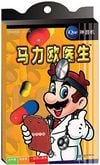
|
iQue Player | Dr. Mario 64 | 马力欧医生 Mǎlìōu Yīshēng Literally "Dr. Mario" |
November 17, 2003 | in Chinese |
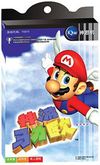
|
iQue Player | Super Mario 64 | 神游马力欧 Shényóu Mǎlìōu Literally "iQue Mario" |
November 21, 2003 | in Chinese |
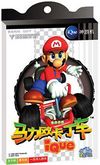
|
iQue Player | Mario Kart 64 | 马力欧卡丁车 Mǎlìōu Kǎdīngchē Literally "Mario Kart" |
December 25, 2003 | in Chinese |
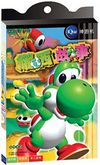
|
iQue Player | Yoshi's Story | 耀西故事 Yàoxī Gùshì Literally "Yoshi Story" |
March 25, 2004 | in Chinese |
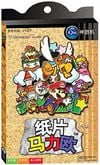
|
iQue Player | Paper Mario | 纸片马力欧 Zhǐpiàn Mǎlìōu Literally "Paper Mario" |
June 8, 2004 | in Chinese |
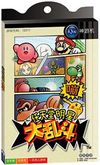
|
iQue Player | Super Smash Bros. | 任天堂明星大乱斗 Rèntiāntáng Míngxīng Dàluàndòu Literally "Nintendo' Stars: Great Melee" |
November 15, 2005 | in Chinese |

|
iQue GBA | Wario Land 4 | 瓦力欧寻宝记 Wǎlìōu Xúnbǎo Jì Literally "Wario's Treasure-seeking Journey" |
June 30, 2004[13] | in Chinese |

|
iQue GBA | Super Mario Advance | 超级马力欧2 Chāojí Mǎlìōu 2 Literally "Super Mario 2" |
June 30, 2004[14] | in Chinese |

|
iQue GBA | WarioWare, Inc.: Mega Microgame$! | 瓦力欧制造 Wǎlìōu Zhìzào Literally "Made by Wario" |
July 4, 2005 | in Chinese |

|
iQue GBA | Yoshi's Island: Super Mario Advance 3 | 耀西岛 Yàoxī Dǎo Literally "Yoshi Island" |
March 2, 2006 | in Chinese |

|
iQue GBA | Super Mario World: Super Mario Advance 2 | 超级马力欧世界 Chāojí Mǎlìōu Shìjiè Literally "Super Mario World" |
March 15, 2006 | in Chinese |

|
iQue GBA | Mario Kart: Super Circuit | 马力欧卡丁车--超级赛道 Mǎlìōu Kǎdīngchē--Chāojí Sàidào Literally "Mario Kart: Super Circuit" |
Canceled[15] | |

|
iQue GBA | Mario & Luigi: Superstar Saga | 马力欧与路易吉RPG Mǎlìōu yǔ Lùyìjī RPG Literally "Mario & Luigi RPG" |
Canceled[16] | |
| File:Nocoverart.png | iQue GBA | Super Mario Advance 4: Super Mario Bros. 3 | 超级马力欧3 Chāojí Mǎlìōu 3 Literally "Super Mario 3" |
Canceled[17] | |

|
iQue GBA | DK: King of Swing | 摇摆森喜刚 Yáobǎi Sēnxǐgāng Literally "Swing Donkey Kong" |
Canceled[18] | |

|
iQue DS | WarioWare: Touched! | 摸摸瓦力欧制造 Mōmō Wǎlìōu Zhìzào Literally "Touch Wario Made" |
July 23, 2005 | in Chinese |
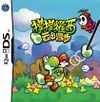
|
iQue DS | Yoshi Touch & Go | 摸摸耀西-云中漫步 Mōmō Yàoxī: Yúnzhōng Mànbù Literally "Touch Yoshi: Strolling in Clouds" |
February 14, 2006 | in Chinese |

|
iQue DS | Super Mario 64 DS | 神游马力欧DS Shényóu Mǎlìōu DS Literally "iQue Mario DS" |
June 21, 2007 | in Chinese |
| File:NSMBChinaBox.png | iQue DS | New Super Mario Bros. | New 超级马力欧兄弟 New Chāojí Mǎlìōu Xiōngdì Literally "New Super Mario Bros." |
July 2, 2009 | in Chinese |

|
iQue DSi | Mario Clock | iQue DSi时钟 红白机马力欧款 iQue DSi Shízhōng Hóngbáijī Mǎlìōu Kuǎn Literally "iQue DSi Clock Famicom Mario Edition" |
January 21, 2010 | in Chinese |

|
iQue DSi | Mario Calculator | iQue DSi计算器 红白机马力欧款 iQue DSi Jǐsuànqì Hóngbáijī Mǎlìōu Kuǎn Literally "iQue DSi Calculator Famicom Mario Edition" |
February 11, 2010 | in Chinese |

|
iQue DSi | WarioWare: Snapped! | 照照瓦力欧制造 Zhàozhào Wǎlìōu Zhìzào Literally "Picture-taking Wario Made" |
March 11, 2010 | in Chinese |

|
iQue DSi | Dr. Mario Express | 一下下马力欧医生 Yíxìaxìa Mǎlìōu Yīshēng Literally "A little bit of Dr.Mario" |
April 8, 2010 | in Chinese |

|
iQue DSi | Game & Watch: Mario's Cement Factory | GAME & WATCH 马力欧的水泥工场 GAME & WATCH Mǎlìōu de Shuǐní Gōngchǎng Literally "GAME & WATCH Mario's Cement Factory" |
February 17, 2011 | in Chinese |
| File:Ball DSiWare.png | iQue DSi | Game & Watch: Ball | GAME & WATCH 抛接球 GAME & WATCH Pāo Jiē Qiú Literally "GAME & WATCH Throw Catch Ball" |
August 12, 2010 | in Chinese |
| File:Chef DSiWare.png | iQue DSi | Game & Watch: Chef | GAME & WATCH 厨师长 GAME & WATCH Chúshī Zhǎng Literally "GAME & WATCH Lead Chef" |
December 2, 2010 | in Chinese |

|
iQue DSi | Game & Watch: Donkey Kong Jr. | GAME & WATCH 森乐刚 GAME & WATCH Sēnlègāng Literally "GAME & WATCH Donkey Kong Jr." |
August 12, 2010 | in Chinese |
| File:Flagman DSiWare.png | iQue DSi | Game & Watch: Flagman | GAME & WATCH 打旗语 GAME & WATCH Dǎ Qíyǔ Literally "GAME & WATCH Play Semaphore" |
December 2, 2010 | in Chinese |

|
iQue 3DS XL | Super Mario 3D Land | 超级马力欧 3D乐园 Chāojí Mǎlìōu 3D Lèyuán Literally "Super Mario 3D Wonderland" |
December 7, 2012 | in Chinese |
| iQue 3DS XL | Mario Kart 7 | 马力欧卡丁车7 Mǎlìōu Kǎdīngchē 7 Literally "Mario Kart 7" |
December 7, 2012 | in Chinese |
Other localized Mario games
These games are localized by iQue, but not distributed by iQue. iQue can be seen credited in these games' credits (except Mario Kart 8 Deluxe).
| Console | Game | Simplified Chinese title | Simplified Chinese avaliability | Game published by |
|---|---|---|---|---|
| Wii/Nvidia Shield | Super Mario Galaxy | 超级马力欧银河 Chāojí Mǎlìōu Yínhé Literally "Super Mario Galaxy" |
March 22, 2018 | Template:Released |
| Wii/Nvidia Shield | New Super Mario Bros. Wii | New 超级马力欧兄弟 Wii New Chāojí Mǎlìōu Xiōngdì Wii Literally "New Super Mario Brothers Wii" |
December 5, 2017 | Template:Released |
| Wii | Super Mario Galaxy 2 | N/A | N/A | Template:Released |
| Nintendo 3DS | Mario Tennis Open | 马力欧网球 公开赛 Mǎlìōu Wǎngqiú Gōngkāisài Literally "Mario Tennis Open" |
April 12, 2013 | Template:Released |
| Nintendo 3DS | New Super Mario Bros. 2 | 新超级马力欧兄弟 2 Xīn Chāojí Mǎlìōu Xiōngdì 2 Literally "New Super Mario Brothers 2" |
June 21, 2013 | Nintendo Hong Kong (HK, TW) |
| Nintendo 3DS | Luigi's Mansion: Dark Moon | 路易吉洋馆2 Lùyìjí Yángguǎn 2 Literally "Luigi Mansion 2" |
July 26, 2013 | Nintendo Hong Kong (HK, TW) |
| Nintendo 3DS | Paper Mario: Sticker Star | 纸片马力欧 超级贴纸 Zhǐpiàn Mǎlìōu Chāojí Tiēzhǐ Literally "Paper Mario: Super Sticker" |
December 6, 2013 | Nintendo Hong Kong (HK, TW) |
| Nintendo Switch | Mario + Rabbids Kingdom Battle | 马力欧+疯狂兔子:王国之战 Mǎlìōu + Fēngkuángtùzi: Wángguó Zhīzhàn Literally "Mario + Rabbids: Battle of the Kingdom" |
August 29, 2017 | Ubisoft (NA, EU, OC) Nintendo (JP, SK, HK, TW) |
| Nintendo Switch | Super Mario Odyssey | 超级马力欧 奥德赛 Chāojí Mǎlìōu Àodésài Literally "Super Mario Odyssey" |
October 27, 2017 | Nintendo (Worldwide) |
| Nintendo Switch | Mario Kart 8 Deluxe | 马力欧卡丁车8豪华版 Mǎlìōu Kǎdīngchē 8 Háohuábǎn Literally "Mario Kart 8 Deluxe Edition" |
December 15, 2017 | Nintendo (Worldwide) |
| Nintendo Switch | Mario Tennis Aces | 马力欧网球Ace Mǎlìōu Wǎngqiú Ace Literally "Mario Tennis Ace" |
June 22, 2018 | Nintendo (Worldwide) |
| Nintendo Switch | Super Mario Party | 超级 马力欧派对 Chāojí Mǎlìōu Pàiduì Literally "Super Mario Party" |
October 5, 2018 | Nintendo (Worldwide) |
| Nintendo Switch | Super Smash Bros. Ultimate | 任天堂明星大乱斗 特别版 Rèntiāntáng Míngxīng Dàluàndòu Tèbiébǎn Literally "Nintendo Stars Great Melee: Special Edition" |
December 7, 2018 | Nintendo (Worldwide) |
| Nintendo Switch | New Super Mario Bros. U Deluxe | New 超级马力欧兄弟U 豪华版 New Chāojí Mǎlìōu Xiōngdì U Háohuábǎn Literally "New Super Mario Brothers U Deluxe Edition" |
January 11, 2019 | Nintendo (Worldwide) |
| Nintendo Switch | Yoshi's Crafted World | 耀西的手工世界 Yàoxī de Shǒugōng Shìjiè Literally "Yoshi's Handicraft World" |
March 29, 2019 | Nintendo (Worldwide) |
| Nintendo Switch | Super Mario Maker 2 | 超级马力欧创作家2 Chāojí Mǎlìōu Chuàngzuòjiā 2 Literally "Super Mario Creator 2" |
June 28, 2019 | Nintendo (Worldwide) |
| Nintendo Switch | Luigi's Mansion 3 | 路易吉洋楼3 Lùyìjí Yánglóu 3 Literally "Luigi Mansion 3" |
October 31, 2019 | Nintendo (Worldwide) |
Names in other languages
| Language | Name | Meaning | Notes |
|---|---|---|---|
| Chinese (simplified) | 神游[?] Shényóu |
"Mental journey" or "wonderful gaming". The name "iQue" is also used in branding. According to Wei Yen, it means "beyond intelligence".[19] |
|
| Chinese (traditional) | 神遊[20] Shényóu |
Same as S. Chinese, "遊" is the Traditional Chinese equivalent of "游" under the definition "to play" or "to travel". |
References
- ^ a b iQue. 关于 iQue. Retrieved December 16, 2016.
- ^ Nintendo (June 28, 2013). "関係会社の状況" (PDF). Retrieved 2014-07-20.
- ^ “‘颜老板在的时候,神游的财务、销售都是独立的,可以自己作主,不用管任天堂的规定。’神游前员工说。当时的神游,与任天堂只是商业合作伙伴的关系,不存在任何行政上的从属关系。” 大狗 (June 22, 2016). 《记录》第17期:神游中国(上). 触乐. Retrieved January 28, 2017.
- ^ From the opening of an interview conducted on the now-defunct Chinese forum levelup.cn between iQue staff and players on August 1, 2007: “iQue神游不是任何一家公司的代理商,iQue拥有各个软硬件的自主产权……” Text of the interview has been researched by 我是金属狂人 (April 15, 2013). 【考古汇总】iQue会客厅 神游访谈录问答精选. Baidu Tieba. Retrieved February 17, 2017.
- ^ The official English name of 万信 is seen from Aquariuslegend (January 23, 2017). 万信国行初代GB 任天堂 GAME BOY 开箱. Chiphell. Retrieved February 5, 2017.
- ^ 我是金属狂人 (June 24, 2013). 任天堂在中国摸爬滚打20年的光辉岁月. Baidu Tieba. Retrieved February 6, 2017.
- ^ “为何在中国大陆推出这样一台特殊的主机、采用如此特殊的游戏销售方式?任天堂社长岩田聪给出了三个理由:收入水平低,物流不发达,盗版泛滥。” 大狗 (June 22, 2016). 《记录》第17期:神游中国(上). 触乐. Retrieved February 22, 2017.
- ^ a b c https://www.ique.com/games/games.htm
- ^ First section of 大狗 (June 23, 2016). 《记录》第17期:神游中国(下). 触乐. Retrieved January 28, 2017.
- ^ “神游盒子” section of 大狗 (June 22, 2016). 《记录》第17期:神游中国(上). 触乐. Retrieved February 28, 2017.
- ^ Chinese nickname seen on the packing box: 行货GBA“小神游”上市 (May 26, 2004). Sina Games. Retrieved March 4, 2017.
- ^ Aaron Kaluszka (January 14, 2007). New GBA SP Designs Released in China. Nintendo World Report. Retrieved March 9, 2017.
- ^ Sina Games. 瓦力欧寻宝记_电视游戏_新浪游戏_新浪网. Sina Corp. Retrieved January 24, 2017.
- ^ Sina Games. 超级马力欧2_电视游戏_新浪游戏_新浪网. Sina Corp. Retrieved January 24, 2017.
- ^ www.kaimaile.com/search?keywords=马力欧
- ^ www.kaimaile.com/search?keywords=马力欧
- ^ www.kaimaile.com/search?keywords=马力欧
- ^ www.kaimaile.com/search?keywords=马力欧
- ^ From Wei Yen: “‘iQue’的意思是超越智慧。还有,体现了人在创造的过程中的一种欢愉感。在中国,大多数翻译是音译,不是意译。有很多人劝我用音译,因为即使是中国人自己的品牌,也喜欢用像英文音译的那种名字。可是我觉得音译没有什么意思,所以我决定用意译。” 大狗 (June 23, 2016). 《记录》第17期:神游中国(下). 触乐. Retrieved January 28, 2017.
- ^ From Hong Kong Wii game Boxart
- ^ From a presentation on the 2003 Tokyo Game Show: 「神遊機(iQue Player) 中国向けの新設計テレビゲーム機」. Dengeki Online (September 26, 2003). 【TGS】任天堂が中国向けに新ハード「神遊」を発売。ソフトはダウンロード方式!. Retrieved January 28, 2017.
External links
- Official Chinese website
- File:English Wikipedia Logo.png iQue on Wikipedia
- File:English Wikipedia Logo.png iQue Player on Wikipedia